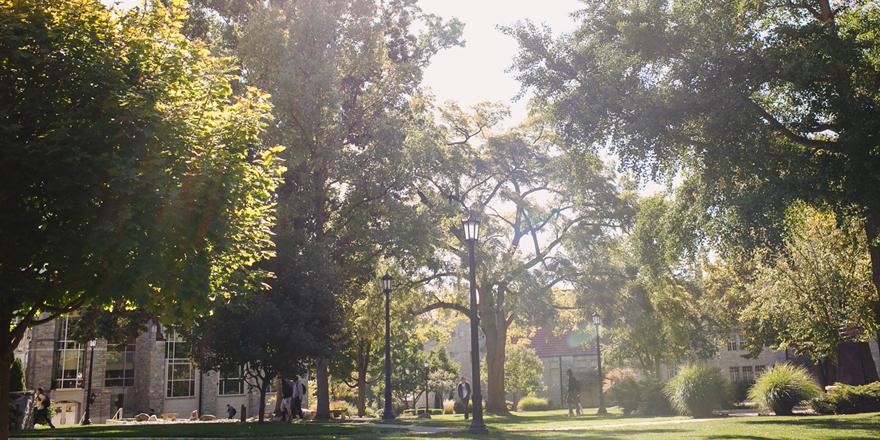
Five Heidelberg students who are majoring in the natural sciences had unique off-campus experiences to conduct and present their research through summer experiences. In their own words, the students describe their research projects, the outcomes and the impact on their classes and their future careers.
Jessica Barnes
Senior, Environmental Science and Business Administration
Research Program: National Science Foundation Research Fellowship at The University of Toledo Lake Erie Center
My research project: I worked with a team of professors and grad students from the Finance and Geographical Information Systems departments on a project related to the algal blooms of Lake Erie. We went out on the lake with other fellows and learned how the Lake Erie Center tests water quality. We were able to use secchi disks and see the City of Toledo’s water intake facility. I was able to formulate a smaller-scale project alongside my professors who were working on a longer-term project.
How I benefited: I learned a significant amount about constructing research, writing and using GIS that will benefit me with my work at Heidelberg.
Melanie Cohn
Senior, Environmental Science and Chemistry
Research Program: Lab and research coursework at Flathead Lake Biological Station at the University of Montana
My research project: I took Field Ecology and Drone Remote Sensing of Freshwater Ecosystems classes, each of which required a research project. For Field Ecology, I studied the invasional front of flowering rush and associated changes in the physical and chemical properties of Flathead Lake. For the Drone Remote Sensing class, I collected remote sensing data by flying drones and used that information and historical data to observe how the Nyack floodplain recovers through successional processes after major disturbance events such as flood or fire.
How I benefited: I gained so much in the way of field and research experience. From flying drones to taking a tiny canoe full of tens of thousands of dollars of equipment out on the lake with only my site partner to do data collection. The most important part for me was getting experience in doing field work, lab work, research and GIS to help me decide what direction I’d like to take in my future career. My eyes were opened to all the possibilities, but I left feeling at home with all the students I had met over the summer. These are my people. This is where I want to take my career.
Enya Granados
Senior, Biology and Education
Research Program: Undergraduate Biology Education Research (UBER) at the University of Georgia
My research project: My main responsibilities included attending research paper reading groups, where we discussed articles we read on a weekly basis, attending research meetings held by faculty, attending professional development courses in research and doing qualitative data analysis on three different projects. The first related to metacognition, where I did large-scale qualitative data analysis. The second was on self-efficacy related to metacognition, where I read a lot of literature, did some data analysis and made recommendations for future studies. The third was about minorities in STEM programs, where I got to do some data analysis and design future interview protocols.
How I benefited: It confirmed to me that diversity-related research gives me meaning and energy. I also know that data collection is something I want to be involved with, rather than just the analysis. I brought back some ideas for my senior Honors project, new data analysis skills and new mentors that can help me for years to come.
Judy Smith
Junior, Environmental Science and Math
Research Program: National Science Foundation Engineering, Modeling and Computational Research at North Carolina Agricultural & Technical State University
My research project: My project involved creating a mathematical model for a small watershed in Dangila, Ethiopia. I used the Soil and Water Assessment Tool (SWAT) and a GIS (Geographic Information System) interface to create this model. I worked with my mentor, Dr. Jha, and one of his Ph.D. students to obtain an accurate model that was then used to change different physical aspects of the watershed, such as land use and agricultural practices, to study how changes affected soil erosion and crop production.
How I benefited: Not only was I able to gain new skills, but I obtained a deeper understanding of the intricacies of watersheds, agriculture and the many variables associated with them. I learned how to create a SWAT model and how to effectively communicate in a mentorship situation. I was surprised to learn that similar work was already being done in the National Center for Water Quality Research here at Heidelberg. My new skills have allowed me to start working at the NCWQR as a research assistant for the modeling research, under Dr. Remegio Confesor and his Ph.D. student.
Amanda Sugrue
Junior, Biochemistry
Research Program: Cincinnati Children’s Hospital SURF Program
My research project: I worked on a study that looked at the effects of traffic population on the many aspects of psychology and anatomy, such as cognition, behavior, brain matter volume and brain micro environments. I used an MRI technique called t2-weighted relaxation which measured the amount of water in a small brain area or microenvironment.
How I benefited: I learned a lot about brain chemistry and anatomy that will give me a leg up in the classes I am taking in the future. I enjoyed being able to present what I had found in the data that I collected.